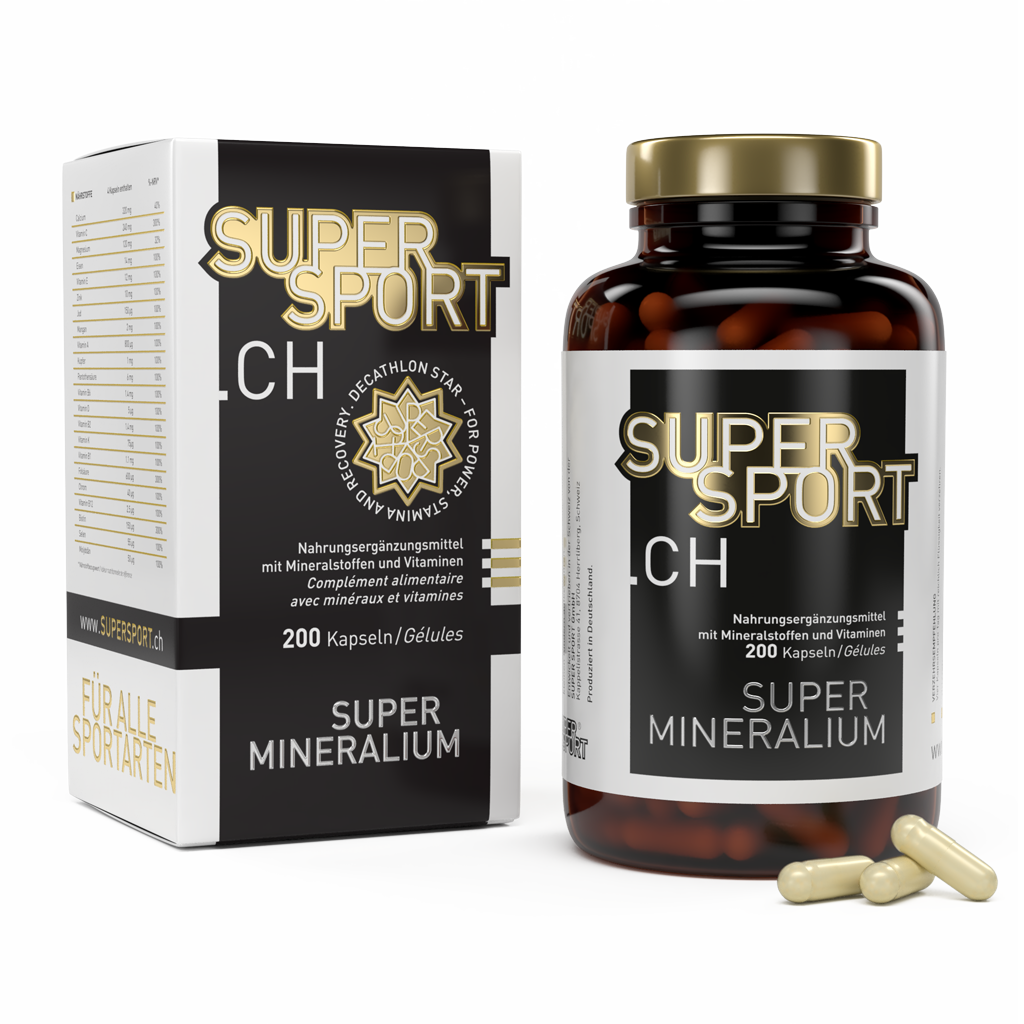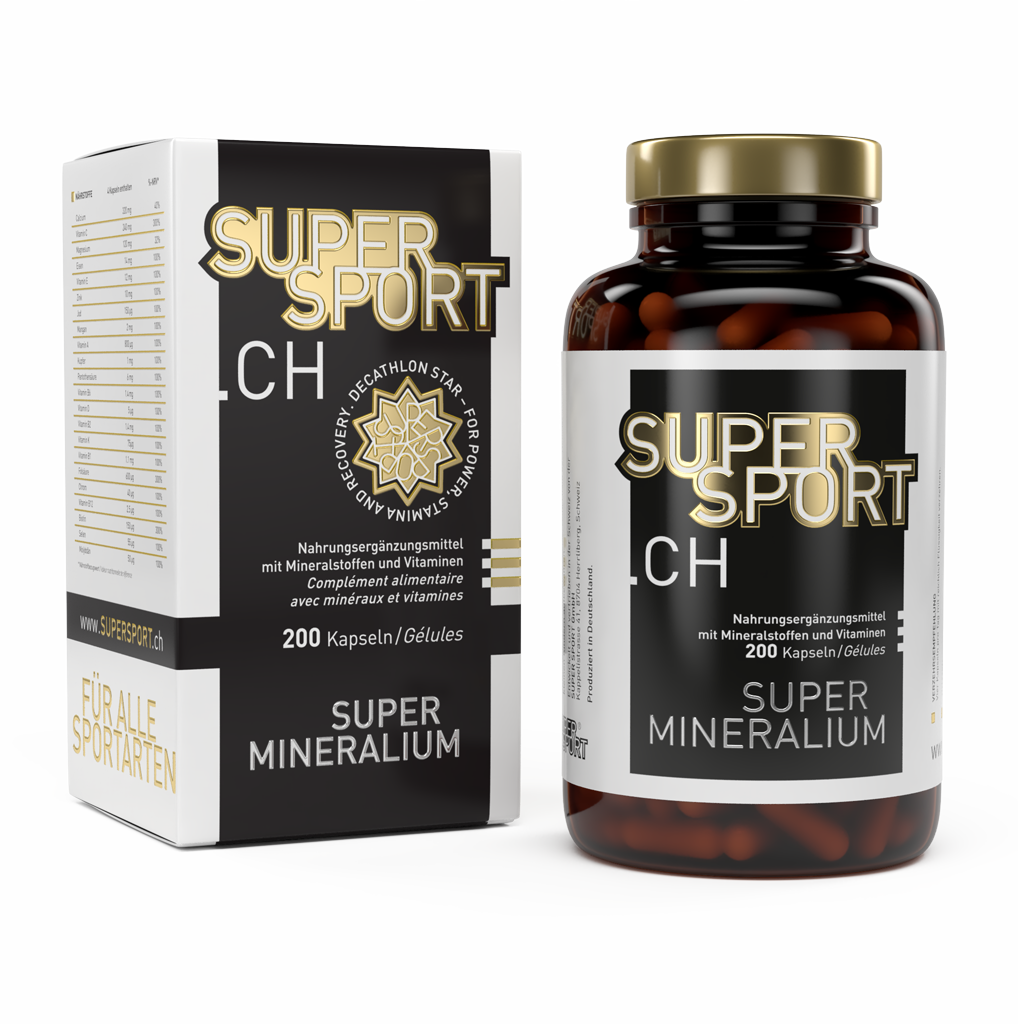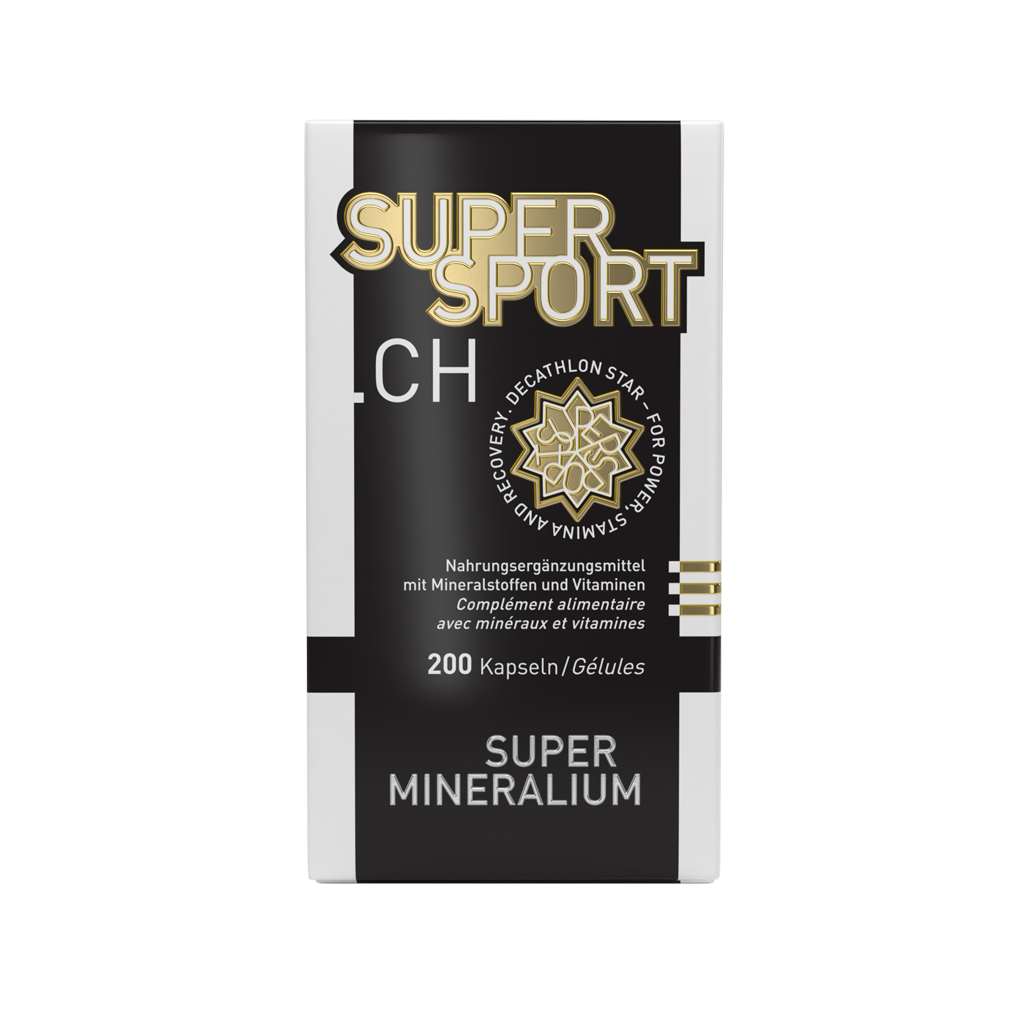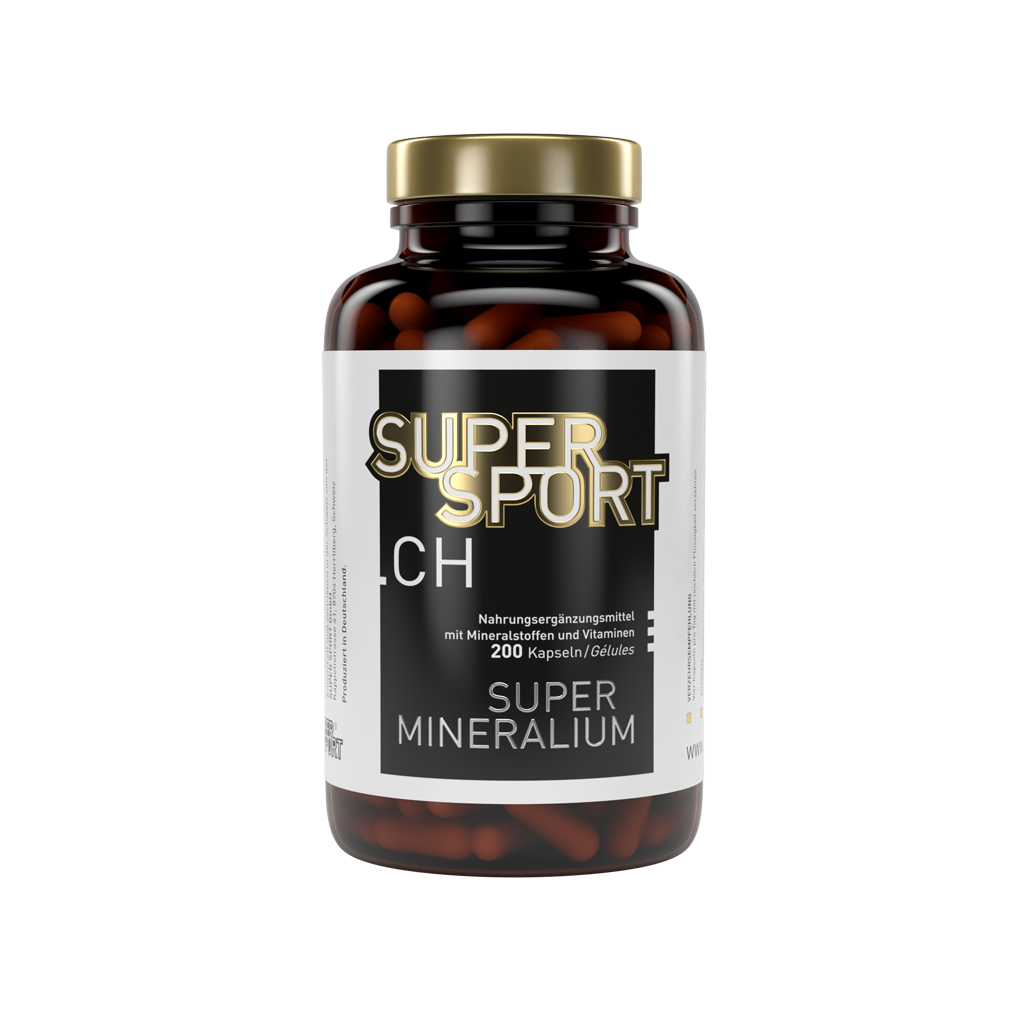Super Mineralium – 200 CAPS
FOOD SUPPLEMENT WITH OPTIMAL DAILY MINERALS AND ACTIVATED VITAMINS – 100% VEGAN
SUPER MINERALIUM is an innovative product which enhances the optimal daily intake of vitamins, minerals and trace elements.
THIS PRODUCT CONTAINS 200 CAPS AND IS ENOUGH FOR 1 MONTHS AND 20 DAYS UP TO 3 MONTHS DUE TO DOSAGE APPLICATION
¥13,164.96
WHAT IT DOES
SUPER MINERALIUM is an innovative product which enhances the optimal daily intake of vitamins, minerals and trace elements. SUPER MINERALIUM comes in the form of a cellulose capsule (the so called hydroxypropyl methylcelluose capsules which have no additional components in comparison to tablets, and act as fiber material in the body). This facilitates the highest possible bioavailability of its elements absorbed by the body. In this way, the vitamins and their active forms, the natural ingredients and the trace elements, are all utilized by the body to their full extent, thus bringing more vital powers to your daily life.
HOW IT WORKS
SUPER MINERALIUM is a balanced food supplement for adults, adolescents, and children from 4 years old:
- Vitamin A, copper, vitamin C and zink contribute to the normal function of the immune system.
- Chromium contributes to the maintenance of normal blood glucose levels.
- Biotin, iron, manganese, vitamin B6, activated B12 contribute to normal energy metabolism.
- Zinc contributes to normal cognitive function and the normal metabolism of macronutrients and the protection of cells from oxidative stress.
- Vitamin D is needed for normal growth and development of bone in children and contributes to the normal function of the immune system in children.
- Iodine contributes to the normal growth of children.
- Perfect during a diet.
- SUPER MINERALIUM supports of the growth of children during the puberty (over 12 years old).
HOW TO TAKE IT
Take 4 capsules daily with water. The capsules can be taken separately on even intervals during the day regardless of the daily meals in order to bring more bioavailability of the product in the body, thus enhancing its activity.
Children from 4 years to 8 years:
2 capsules daily with water (if children cannot swallow the capsule, it can be opened).
Children from 9 years to 18 years:
4 capsules daily with water.
ADVANCED NUTRIENT FEATURES
Activated vitamin B2, activated vitamin B12, and activated folic acid are the main ingredients of the SUPER MINERALIUM product. The activated forms of the vitamins are the last step before implementation in the metabolism, and they are utilized without transformation loss, which guarantees their higher quantity and activity. SUPER MINERALIUM also contains natural substances: an active fruit-berry-mix with a super ORAC (antioxidative capacity) value <6000 µmoles TE/g.
Ingredients List
| AMOUNT PER DAILY INTAKE (based on 4 capsules) | %-NRV* | |
|---|---|---|
| Calcium | 320 mg | 40% |
| Vitamin C | 240 mg | 300% |
| Magnesium | 120 mg | 32% |
| Iron | 14 mg | 100% |
| Vitamin E | 12 mg | 100% |
| Zinc | 10 mg | 100% |
| Iodine | 150 μg | 100% |
| Manganese | 2 mg | 100% |
| Niacin | 16 mg | 100% |
| Vitamin A | 800 μg | 100% |
| Copper | 1 mg | 100% |
| Pantothenic Acid | 6 mg | 100% |
| Vitamin B6 | 1.4 mg | 100% |
| Vitamin D | 5 μg | 100% |
| Vitamin B2 | 1.4 mg | 100% |
| Vitamin K | 75 μg | 100% |
| Vitamin B1 | 1.1 mg | 300% |
| Folic acid | 600 μg | 100% |
| Chromium | 40 μg | 100% |
| Vitamin B12 | 2.5 μg | 300% |
| Biotin | 150 μg | 100% |
| Selenium | 55 μg | 100% |
| Molybdenum | 50 μg | 100% |
The product comes in glass bottle with metal screw lid, packed with PVC sleeve in luxury carton box. Quantity: 200 caps / 129.5 g
MAXIMUM PROTECTION AND SAFETY
The brown glass is protecting the capsules from the damaging effect of light, while the metal screw lid with air tide press sealing and head sleeve is acting as a barrier against air circulation that could bring oxidative damage to the freshly produced and filled into the bottle capsules. The carton box acts as light and glass breaking protection.
Keep out of reach of children. Consult your physician before using this product, in case you’re pregnant, lactating, under age of 18, if you have any known or suspected medical condition(s) or use any prescribed medicine(s). Do not exceed the maximum recommended daily amount. This product is not a substitute for a balanced daily meal diet. Store this product in a cool and dry place under 25C with the lid tightly closed. Manufactured in Germany, in accordance with ISO 9001:2000 quality standard.

Ingredients Explanation
Calcium
Calcium is the most common mineral in the human body, with 99% in bones and teeth, where it plays a structural role. Calcium deficiency in children leads to rickets, and in adults – to bone softening and osteoporosis (loss of calcium from the bones and thinning, which makes them brittle and prone to breakage). Reduced levels of calcium in the bones can occur in individuals from all ages, mostly in women during menopause.
Vitamin C
Vitamin C provides valuable support to the immune system. Vitamin C is a powerful antioxidant that neutralizes the effects of free radicals which can damage the cells in the human body. Vitamin C is involved in the production of endogenous collagen and controls the production of L-carnitine. It also plays an important role in the development of teeth, gums, muscles and bones, as well as in fat burning.
Since vitamin C helps iron absorption, it has a beneficial effect on the oxygen content in the blood. Vitamin C deficiency can occur through frequent and prolonged infections and colds. Its lack affects the good general condition and the working capacity. Because of its central role in the formation of connective tissue, vitamin C deficiency also has a negative effect on the structure and the health of the skin. Many people have increased need for vitamin C like smokers or athletes, as well as people who are exposed to daily stress. Food supplements can provide an adequate supply of vitamin C in these cases. Vitamin C reduces the urinary pH and thus helps to reduce bacteria in the urinary tract that are not acid resistant. Vitamin C is important for the biosynthesis and helps the detoxification process in the body. It is also involved in the metabolism of iron. Vitamin C also stimulates the production of noradrenaline and supports the conversion of fat into energy. This makes vitamin C an active fat burning food supplement.
Magnesium
Magnesium is very important for the muscles as it acts as an electrolyte for the nerve impulses that help their function. Since magnesium is essential for the muscle function, magnesium deficiency manifests itself in sports with muscle tremors or spasms. We draw on our own magnesium even when we sweat, which is why it is recommended to pay attention to the regular intake of magnesium when working out regularly. Muscle tension that causes problems with back and neck may also be a result of the lack of magnesium. If the deficiency becomes permanent, the stability of bones and teeth could be affected, as well as the conduct of all enzyme dependent processes. People with problems in the gastro-intestinal activity in particular can suffer from magnesium deficiency. In order to burn fat, our body needs more magnesium than the normal daily dose.
Iron
Iron is responsible for many processes in the body. For example, iron supports the oxygen supply of the tissues, and it stimulates the metabolism. It is also a necessary mineral for the growth, development and normal functioning of the cells as well as for the synthesis of certain hormones and connective tissue. Supplementation with iron is particularly recommended for anemia or low levels of RBCs. Iron strengthens the body and helps to reduce the symptoms of fatigue.
Vitamin E
Vitamin E is best known as a fat-soluble “hunter of free radicals.” Just like vitamins A and C, it protects the body’s cells against aggressive oxygen compounds, and environmental toxins. Thus, vitamin E can delay premature aging and prevent cell damages which lead to illnesses and even degeneration of cells. Vitamin E, due to its antioxidant effect, reduces the feeling of stress. People lacking vitamin E are much more likely to suffer depression than those with normal levels. Vitamin E also plays an important role in the protein and fat metabolism. Since vitamin E has an anti-inflammatory effect, it can also help relieve rheumatic pains. In addition, vitamin E supports the cardiovascular system functions by reducing the “bad” cholesterol, thus having a positive effect on blood vessels. Second, it prevents the adhesion of red blood cells and thereby improves the blood circulation. Signs of vitamin E deficiency are skin problems, muscle weakness and a higher susceptibility to infections. Additional intake of vitamin E in the daily diet can be conveniently and easily achieved through supplements.
Zinc
Zinc is involved in the metabolism of proteins, lipids and carbohydrates. It is also very important for the production of collagen in the body. Zinc helps to form a fiber network that traps red blood cells, and thus, speeds up wound healing. It protects from premature ageing, stimulates the immune system, and it keeps skin and hair in good condition. It has a beneficial effect on the reproductive organs. Zinc is also a powerful antioxidant. In combination with vitamin A, it helps to maintain good eyesight.
Iodine
Iodine is one of the main components of thyroid hormones. Sufficient amounts of iodine in the body are of particular importance for the regulation of many biochemical reactions, including protein synthesis and enzyme activity, as well as stimulating the metabolism. Iodine deficiency may cause problems in the development of the skeletal and central nervous systems in the fetus and in young children, which is why additional intake during pregnancy and lactation is recommended.
Manganese
Manganese has a beneficial effect on the bone structure and the bone metabolism and it helps the body to produce key enzymes associated with the construction of bones. Manganese is involved in the formation of connective tissue, it also contributes to an increased calcium absorption by the body, it improves the thyroid gland function, and it regulates the steroids production.
NIACIN
Niacin, also known as vitamin B3, helps for the smooth functioning of the metabolism as the other B-group vitamins. Niacin is also important for the skin, nerves and cell nuclei. Vitamin B3 gives more energy, better endurance during exercise, and promotes muscle growth. The body can supply itself with the vitamin through the food or it can produce it from the amino acid tryptophan. With nutritional supplements containing vitamin B3, you can make up for any deficiency caused by an unbalanced diet or a disease. Group B vitamins are known as “brain food”. Almost all of these are water-soluble and therefore should be taken systematically as they are not retaining in the body.
Vitamin A
Vitamin A supports the immune system, the good eyesight (in combination with zinc), and it increases the body’s resistance to infectious diseases. This vitamin is important for the eyes, and as an ingredient of the pigment rhodopsin it is responsible for vision at dusk.
Copper
Copper is an important mineral involved in many biochemical reactions in the cells. It is needed in order to transform iron into hemoglobin. It is extremely useful in the fight against macular degeneration. New studies indicate that copper can have a positive effect on Alzheimer’s prevention.
Pantothenic Acid
Pantothenic acid is an essential for the production of coenzyme A, which in turn is necessary for the metabolism of carbohydrates, proteins and fats. Thus, pantothenic acid plays an important role in supplying the body with energy. Pantothenic acid also supports the protective function of the mucous membranes. Pantothenic acid deficiency may occur in people who suffer from intestinal diseases. Anemia, weakened immune system, and burning or numb legs and feet can be a sign of such deficiency.
Vitamin B6
The body needs vitamin B6, also known as pyridoxine, to transform the amino acids from the food into its own proteins, which makes it very important for the metabolism. Vitamin B6 is needed to form and participate in the development of red blood cells that supply the body with oxygen. Even the immune and nervous systems are affected by vitamin B6. For example, vitamin B6 is needed to form the “hormone of happiness” serotonin. Fatigue, insomnia and nervousness can be symptoms of weakening of the nervous system based on the lack of vitamin B6. Even with a strong immune protection, vitamin B6 deficiency may have a negative effect. A protein-rich diet raises the need for vitamin B6. Products containing vitamin B6 can easily supply the necessary daily intake. This vitamin is responsible to maintain the normal magnesium content of the body, the activity of the brain and for the muscle activity.
Vitamin D
Vitamin D plays an important role in the regulation of calcium levels in the blood and in the bone structure. Vitamin D deficiency leads to rickets during the childhood, and to osteomalacia / osteoporosis in adults. Since the 1990s, vitamin D has been shown to function in various other ways and in different tissues, including cell differentiation, cell proliferation inhibition, apoptosis (cell death), immune modulation and control of other systems.
Vitamin B2
Vitamin B2 plays a central role in metabolism. It supports the conversion of carbohydrates, proteins and fats into energy. Vitamin B2 also has an important function in the conversion of nutrients into fatty acids and endogenous proteins. It also supports the functions of vitamins B6 and B3. This vitamin is responsible for the normal growth of the body, and for the supply of the cells with energy.
Vitamin K
Vitamin K is crucial for the clotting of blood, it limits the bleeding and prevents from excessive bleeding. It is necessary for the complete absorption of calcium and vitamin D. This vitamin strengthens the bones, it protects them from thinning during menopause, and it also reduces the risk of fractures, cavities and dental problems. Vitamin K plays an important role in the prevention and the treatment of osteopenia and osteoporosis.
Vitamin B1
Vitamin B1 has an important role in the proper functioning of muscles and nerves. Like other vitamins of group B, it is also involved in cellular metabolic processes. It helps as a body’s coenzyme to get energy from carbohydrates and fats and thus affects memory performance. Poor memory or fatigue may be a sign of lack of vitamin B1, from which the human body can only accumulate small supplies. High physical load can increase the likelihood of a deficiency of this vitamin because of the speed-up of the carbohydrate metabolism. This vitamin is essential for the metabolism of carbohydrates, for the flow of nerve impulses, and for the normal functioning of the muscles. Vitamin B1 is also involved in the formation of neural tissue.
Folic Acid
Vitamin B9 is better known with its chemical name — “folic acid”. Like all B vitamins, folic acid helps the metabolism. In addition, folic acid performs important functions in cell division and cell growth. The construction of genetic material, red blood cells and muscles functions smoothly only with folic acid. Anemia, skin changes and difficult wound healing may be signs of folic acid or vitamin B9 deficiency.
Chromium
Chromium is a factor involved in the processing of sugar in the body. It interacts with insulin and the insulin receptors in the cell walls, and it helps regulate the sense of hunger.
Vitamin B12
Vitamin B12 is needed only in small amounts but it plays an important role in cell division and cell growth. Vitamin B12 is also essential for the formation of red blood cells. Like vitamin B9 it can serve to stop the progression of atherosclerosis, and thus to prevent cardiovascular diseases. The immune and nervous systems are also positively affected by vitamin B12. Like all other vitamins of group B, it is involved in the cellular metabolism. People who maintain a strict vegetarian or vegan diet and do not consume any animal food often suffer from vitamin B12 deficiency. The absorption of vitamin B12 may be impaired in people who suffer from stomach and intestinal diseases related to the lack of gastric acid. The lack of vitamin B12 is manifested by physical exhaustion, memory problems and, in extreme cases, permanent damage of the nerves. This vitamin is absolutely necessary for the formation of red blood cells, cell renewal, muscle building, and normal growth and functioning of the nervous system.
Biotin
Biotin, likes all vitamins in the B complex, is an essential for the smooth flow of the metabolism. It plays an important role as coenzyme during the buildup and decomposition of fatty acids. Biotin is known for its beneficial effect on the health and beauty of the skin, hair and nails. Flaky skin, brittle nails and hair, hair loss, and a weakened immune system — these may be the first signs of biotin deficiency. Smokers, athletes, pregnant and breastfeeding women, and people who often drink alcohol should pay special attention to the sufficient supply of biotin.
Selenium
Selenium is one of the most important trace elements that are necessary for the human organism. It is a cofactor in many enzymes which protect the cells from the toxic action of free radicals. This determines its antioxidant and anti-inflammatory action. In recent years, the selenium deficiency is considered to be a possible etiologic factor in certain cardiovascular diseases because the free radicals destroy the cell membranes when the amount of selenium in the body is insufficient. Selenium reduces the risk of cancer, it contributes to the clearing of heavy metals from the body, including cadmium and arsenic, and it is a necessary supplement for smokers and residents in big cities. For men, selenium stimulates the sex hormones synthesis and it is required for the support of the normal sexual function. Moreover, selenium slows down the tissues aging, including the skin, by making it smoother and tighter. It is also important for the eye health and for the bones. For menopausal women selenium helps to relieve the attacks of hot and cold waves. The combined intake of selenium, vitamin E and pro-vitamin A /beta carotene/ mutually reinforces their effects.
Molybdenum
Molybdenum is a micro-element which is found naturally in the human body, mostly in the liver, the kidneys, the glands and the bones. The presence of molybdenum in the body supports the liver function, and it has a positive effect on fungal infections, allergies, asthma, acne, eczema, anemia, insomnia, osteoporosis, libido, and others. Molybdenum deficiency in the body is a relatively rare phenomenon which predisposes to fungi development, and decreases the body’s ability to fight free radicals.
FAQ
HOW DO YOU SHIP MY ORDER?
All your orders are sent via DHL.
HOW MUCH IS THE DELIVERY?
The delivery fee is different for each country.
WHAT ARE THE PAYMENT METHODS AVAILABLE?
We accept debit/credit cards, PayPal and Twint.
CAN I PAY USING PAYPAL WITHOUT A PAYPAL ACCOUNT?
Yes! It is commonly misunderstood that a Paypal account is needed in order to make payments through Paypal. The truth is you DO NOT need one, although we strongly recommend you sign up to enjoy the added ease of use.
Without a Paypal account, all you need is any Debit/Credit card stated below that is supported by Paypal.
By using Paypal, we can process & deliver your orders to you in a shorter time. Paypal is the easiest & most secure way to make payment online. No account needed.
For more details, click here to see how Paypal works for you.
HOW DO I MAKE PAYMENTS USING PAYPAL? HOW DOES IT WORK?
Paypal is the easiest way to make payments online. While checking out your order, you will be redirected to the Paypal website. Be sure to fill in correct details for fast & hassle-free payment processing.
It’s fast, easy & secure.
HOW LONG WILL IT TAKE FOR MY ORDER TO ARRIVE AFTER I MAKE PAYMENT?
You should expect to receive your orders within five (5) to ten (10) working days upon payment verification depending on the volume of orders received.
If you experience delays in receiving your order, contact us immediately, and we will help to confirm the status of your order.







